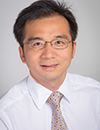Tony Jun Huang,
William Bevan Distinguished Professor of Mechanical Engineering and Materials Science
Tony Jun Huang is the William Bevan Distinguished Professor of Mechanical Engineering and Materials Science at Duke University. Previously he was a professor and the Huck Distinguished Chair in Bioengineering Science and Mechanics at The Pennsylvania State University. He received his Ph.D. degree in Mechanical and Aerospace Engineering from the University of California, Los Angeles (UCLA) in 2005. His research interests are in the fields of acoustofluidics, optofluidics, and micro/nano systems for biomedical diagnostics and therapeutics. He has authored/co-authored over 260 peer-reviewed journal publications in these fields. His journal articles have been cited more than 32,000 times, as documented at Google Scholar (h-index: 95). He also has 26 issued or pending patents. Prof. Huang was elected a fellow (member) of National Academy of Inventers (USA) and the European Academy of Sciences and Arts. He was also a fellow of the following six professional societies: American Association for the Advancement of Science (AAAS), the American Institute for Medical and Biological Engineering (AIMBE), the American Society of Mechanical Engineers (ASME), the Institute of Electrical and Electronics Engineers (IEEE), the Institute of Physics (UK), and the Royal Society of Chemistry (UK). In addition, he has selected to receive many prestigious awards and honors including a 2010 National Institutes of Health (NIH) Director’s New Innovator Award, a 2012 Outstanding Young Manufacturing Engineer Award from the Society for Manufacturing Engineering, the 2014 IEEE Sensors Council Technical Achievement Award from the Institute of Electrical and Electronics Engineers (IEEE), the 2017 Analytical Chemistry Young Innovator Award from the American Chemical Society (ACS), the 2019 Van Mow Medal from the American Society of Mechanical Engineers (ASME), and the 2019 Technical Achievement Award from the IEEE Engineering in Medicine and Biology Society (EMBS). In the last two consecutive years (2022-2023), he has been named to a global list of the most highly cited researchers (cross field) by Clarivate (Web of Science).
|

|
|
